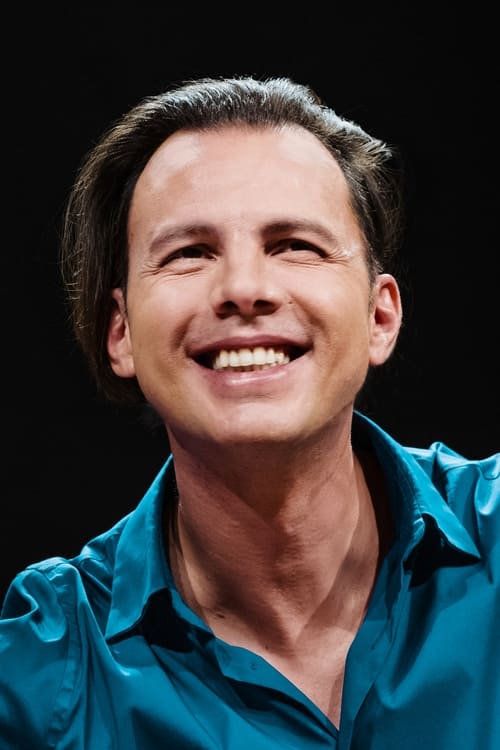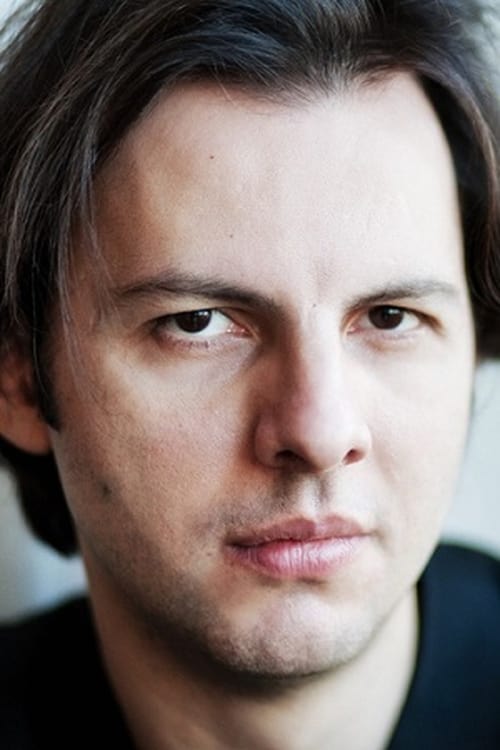
Conductor
Utopia, the new orchestra of conductor Teodor Currentzis, can be experienced for the first time in Vienna on its inaugural tour with the 1945 version of Igor Stravinsky’s ‘The Firebird’ and Maurice Ravel’s Suite No. 2 of ‘Daphnis et Chloé’, ‘La Valse’ and ‘Boléro’.

Self – Conductor
Utopia, the new orchestra of conductor Teodor Currentzis, can be experienced for the first time in Vienna on its inaugural tour with the 1945 version of Igor Stravinsky’s ‘The Firebird’ and Maurice Ravel’s Suite No. 2 of ‘Daphnis et Chloé’, ‘La Valse’ and ‘Boléro’.
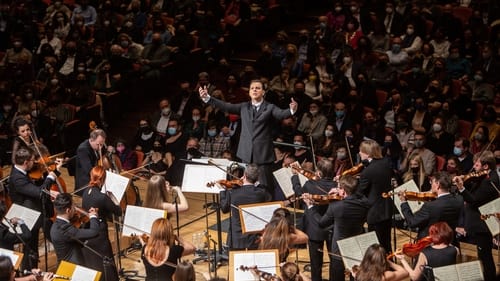
Music Director
Ludwig van Beethoven headed for Symphony No. 9 literally his entire life. As early as the 1790s, he had an eye on Ode to Joy, perhaps the most well-known poem by Friedrich Schiller, written on the threshold of the French Revolution (1786). In his mature and, in particular, later years, the deaf composer with an acute ‘hearing vision’ increasingly distanced himself from conventional forms and genres and wrote parts beyond the possibilities of instruments of his day. He nurtured the idea of a symphony with a choir for at least several years. The history of the Ninth’s interpretations includes 200 years of staggering revelations and lingering stagnation. Performed by the musicAeterna orchestra, choir, and guest soloists under the baton of Teodor Currentzis, Beethoven’s opus magnum acquires the original poignancy and energy of a recent discovery.

Conductor
Ludwig van Beethoven headed for Symphony No. 9 literally his entire life. As early as the 1790s, he had an eye on Ode to Joy, perhaps the most well-known poem by Friedrich Schiller, written on the threshold of the French Revolution (1786). In his mature and, in particular, later years, the deaf composer with an acute ‘hearing vision’ increasingly distanced himself from conventional forms and genres and wrote parts beyond the possibilities of instruments of his day. He nurtured the idea of a symphony with a choir for at least several years. The history of the Ninth’s interpretations includes 200 years of staggering revelations and lingering stagnation. Performed by the musicAeterna orchestra, choir, and guest soloists under the baton of Teodor Currentzis, Beethoven’s opus magnum acquires the original poignancy and energy of a recent discovery.

Self – Conductor
Ludwig van Beethoven headed for Symphony No. 9 literally his entire life. As early as the 1790s, he had an eye on Ode to Joy, perhaps the most well-known poem by Friedrich Schiller, written on the threshold of the French Revolution (1786). In his mature and, in particular, later years, the deaf composer with an acute ‘hearing vision’ increasingly distanced himself from conventional forms and genres and wrote parts beyond the possibilities of instruments of his day. He nurtured the idea of a symphony with a choir for at least several years. The history of the Ninth’s interpretations includes 200 years of staggering revelations and lingering stagnation. Performed by the musicAeterna orchestra, choir, and guest soloists under the baton of Teodor Currentzis, Beethoven’s opus magnum acquires the original poignancy and energy of a recent discovery.

Conductor
For Mahler, symphonies always were a means of interpreting the most convoluted philosophical problems that couldn’t be resolved verbally. The ambitious structure of the five-part Fifth Symphony spans from the Funeral March to the roaring finale. It is a forthright attempt to resolve the tragic conflict with the surrounding world. The brilliant fourth part of the symphony, Adagietto, resembles a beautifully mysterious flower that every conductor reimagines in their own style. As one of the twentieth century’s most influential maestros, Mahler redefined the conductor’s role. For him, the conductor is just as integral to his own musical works as they are to the composer. When a maestro steps onto the podium and opens the score, he recreates musical universes from scratch. Teodor Currentzis and the musicAeterna orchestra have performed Mahler’s symphonies around the world for many years. The Fifth Symphony has earned its place as one of the highlights of the cycle.

Self – Conductor
For Mahler, symphonies always were a means of interpreting the most convoluted philosophical problems that couldn’t be resolved verbally. The ambitious structure of the five-part Fifth Symphony spans from the Funeral March to the roaring finale. It is a forthright attempt to resolve the tragic conflict with the surrounding world. The brilliant fourth part of the symphony, Adagietto, resembles a beautifully mysterious flower that every conductor reimagines in their own style. As one of the twentieth century’s most influential maestros, Mahler redefined the conductor’s role. For him, the conductor is just as integral to his own musical works as they are to the composer. When a maestro steps onto the podium and opens the score, he recreates musical universes from scratch. Teodor Currentzis and the musicAeterna orchestra have performed Mahler’s symphonies around the world for many years. The Fifth Symphony has earned its place as one of the highlights of the cycle.

Self
Alla Demidova ranks among the greatest actresses to have graced the Russian-language stage over the past six decades, as well as screens big and small. She's famous for her tragic characters. Perhaps because she, above all, understands the world as a realm of worries and sorrow?
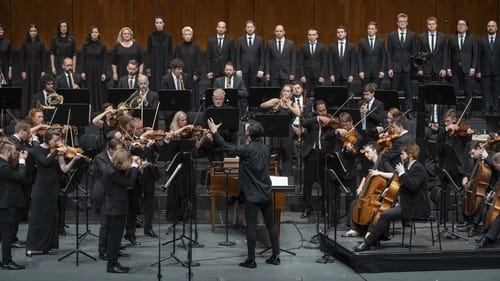
Music Director
At the Salzburg Festival 2021, the musicAeterna Orchestra conducted by Teodor Currentzis performed the last symphonies of Wolfgang Amadeus Mozart – No. 40 K. 550 and No. 41 K. 551 Jupiter. The two pinnacles of Mozart’s symphonic heritage are interconnected: the classic wrote symphonies No. 39–41 in one short period of just a few fruitful weeks in 1788. In the concert the two symphonies – the two sides of Mozart’s unfathomable genius – are joined by works that are close to them both in spirit and the time of creation: the orchestral Masonic Funeral Music in C minor, the recitative and aria of Donna Anna from the finale of the opera Don Giovanni and the chorus from the spiritual cantata Davide penitente created in 1785.

Conductor
At the Salzburg Festival 2021, the musicAeterna Orchestra conducted by Teodor Currentzis performed the last symphonies of Wolfgang Amadeus Mozart – No. 40 K. 550 and No. 41 K. 551 Jupiter. The two pinnacles of Mozart’s symphonic heritage are interconnected: the classic wrote symphonies No. 39–41 in one short period of just a few fruitful weeks in 1788. In the concert the two symphonies – the two sides of Mozart’s unfathomable genius – are joined by works that are close to them both in spirit and the time of creation: the orchestral Masonic Funeral Music in C minor, the recitative and aria of Donna Anna from the finale of the opera Don Giovanni and the chorus from the spiritual cantata Davide penitente created in 1785.

Self – Conductor
At the Salzburg Festival 2021, the musicAeterna Orchestra conducted by Teodor Currentzis performed the last symphonies of Wolfgang Amadeus Mozart – No. 40 K. 550 and No. 41 K. 551 Jupiter. The two pinnacles of Mozart’s symphonic heritage are interconnected: the classic wrote symphonies No. 39–41 in one short period of just a few fruitful weeks in 1788. In the concert the two symphonies – the two sides of Mozart’s unfathomable genius – are joined by works that are close to them both in spirit and the time of creation: the orchestral Masonic Funeral Music in C minor, the recitative and aria of Donna Anna from the finale of the opera Don Giovanni and the chorus from the spiritual cantata Davide penitente created in 1785.

Self – Conductor
Premiered in 1787, “Don Giovanni” exposes the timeless theme of a man hovering between vitality and destruction. Neither morality nor the law can stop this serial lover in his quest to conquer all women as he places his own pleasure above all other principles. Today, the rich depth of Mozart’s masterpiece still astonishes audiences with its mix of comedy and seriousness, pleasure and love, entertainment and murder. At the helm of this new Salzburg Festival production, in a near-live broadcast from the Great Festival Hall, director Romeo Castellucci promises to focus on the ambiguity and inner turmoil of this serial lover whose immoral behaviour condemns him to a deadly solitude. The exceptional cast – featuring Italian baritone Davide Luciano (Don Giovanni), Russian soprano Nadezhda Pavlova (Donna Anna) and Finnish bass Mika Kares (the Commendatore) – is accompanied by the chorus and musicians of the musicAeterna ensemble, conducted by Vitaly Polonsky and Teodor Currentzis.

Conductor
Premiered in 1787, “Don Giovanni” exposes the timeless theme of a man hovering between vitality and destruction. Neither morality nor the law can stop this serial lover in his quest to conquer all women as he places his own pleasure above all other principles. Today, the rich depth of Mozart’s masterpiece still astonishes audiences with its mix of comedy and seriousness, pleasure and love, entertainment and murder. At the helm of this new Salzburg Festival production, in a near-live broadcast from the Great Festival Hall, director Romeo Castellucci promises to focus on the ambiguity and inner turmoil of this serial lover whose immoral behaviour condemns him to a deadly solitude. The exceptional cast – featuring Italian baritone Davide Luciano (Don Giovanni), Russian soprano Nadezhda Pavlova (Donna Anna) and Finnish bass Mika Kares (the Commendatore) – is accompanied by the chorus and musicians of the musicAeterna ensemble, conducted by Vitaly Polonsky and Teodor Currentzis.
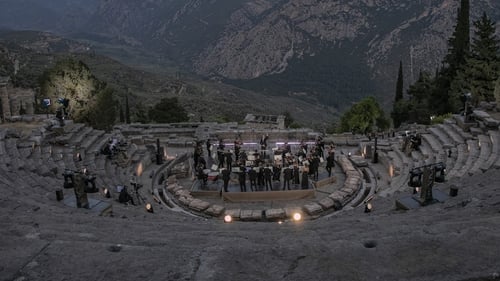
Music Director
In the ancient theater of Delphi, against the backdrop of the ruins of the Temple of Apollo, musicAeterna, conducted by Teodor Currentzis, performs Ludwig van Beethoven’s 7th Symphony, in conjunction with a new choreography by Sasha Waltz and her company.

Self – Conductor
In the ancient theater of Delphi, against the backdrop of the ruins of the Temple of Apollo, musicAeterna, conducted by Teodor Currentzis, performs Ludwig van Beethoven’s 7th Symphony, in conjunction with a new choreography by Sasha Waltz and her company.

Conductor
In the ancient theater of Delphi, against the backdrop of the ruins of the Temple of Apollo, musicAeterna, conducted by Teodor Currentzis, performs Ludwig van Beethoven’s 7th Symphony, in conjunction with a new choreography by Sasha Waltz and her company.

Self
The 9th Symphony of Ludwig van Beethoven is one of the most popular pieces of classical music in the world. Even those who are not passionate about the classical music recognize the famous Ode to Joy. Despite the grim context in which it was created, the 9th Symphony leaves us fascinated, moved and uplifted by its creativity, its power and its culmination in the Ode to Joy. More than 160 years after it was written, Beethoven’s hymn to brotherhood was adopted by the European Union as its official anthem. But Beethoven’s Ninth is also met with enthusiasm far beyond the borders of Europe. What’s the explanation for its never ending success? What is it about this work of art that fascinates people all over the world?

Self

Conductor
The project “Fragments” features a series of iconic opera scenes recorded during lockdown at musicAeterna’s home residence, Dom Radio in St Petersburg. With their signature perfectionism and dedication, Teodor Currentzis and the musicians have spent many hours rehearsing and recording in the studio in order to capture the true expressiveness of the performed masterpieces.
Each of the recorded scenes will get its own visualization by various filmmakers who will create videos that reflect the concepts behind the music. The first recording in the series is taken from Giuseppe Verdi’s La Traviata and is made in collaboration with NOIR Films (St Petersburg), a team of video artists that specializes in experimental films and video art.

Conductor
The project “Fragments” features a series of iconic opera scenes recorded during lockdown at musicAeterna’s home residence, Dom Radio in St Petersburg. With their signature perfectionism and dedication, Teodor Currentzis and the musicians have spent many hours rehearsing and recording in the studio in order to capture the true expressiveness of the performed masterpieces.
Each of the recorded scenes will get its own visualization by various filmmakers who will create videos that reflect the concepts behind the music. The first recording in the series is taken from Giuseppe Verdi’s La Traviata and is made in collaboration with NOIR Films (St Petersburg), a team of video artists that specializes in experimental films and video art.
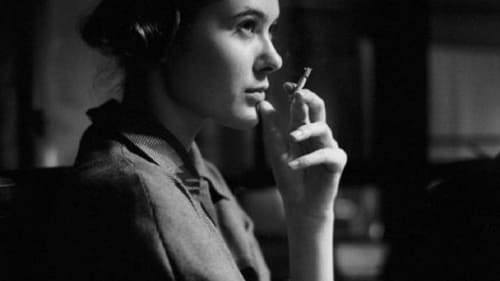
Dau
Katya, una joven bibliotecaria, cree en el amor, pero sus ideales son aplastados por la realidad. Después de una serie de relaciones decepcionantes, Katya finalmente encuentra ternura y comprensión en los brazos de su colega, una periodista llamada Tanya. Pero luego interviene el Primer Departamento: los servicios de seguridad del Estado ven esta relación como inaceptable para una mujer soviética.

Dau
Nikita Nekrasov is a scientist, a theoretical physicist who studies our world and other possible worlds. He refuses to make a choice between mathematics and physics, between one woman and another, as he ponders the existence of the multi-universe. At scientific conferences, attended by eminent foreign scientists and a rising younger generation of physicists alike, Nekrasov gets carried away debating the beauty of string theory. He attempts to explain to all of his women – Katya, the librarian, Zoya, the scientific secretary, Svetalana, the head of department – about the theory of his own polygamy, and the possibility of having enough feelings to satisfy everyone.
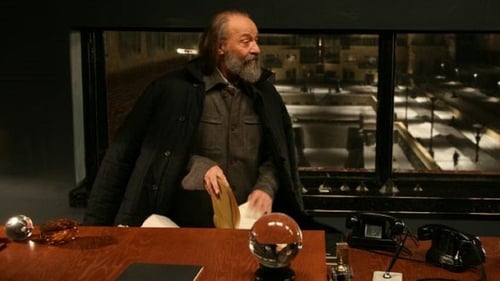
Dau
«The Return of the Prodigal Son» is the first volume from the film (novel) of Anatoli Vassiliev’s «Empire» inside the Dau cycle. The story is about inner kinship, which is much closer than blood, about inevitable betrayal, about almost fatherly love and forgiveness. Cigarettes (papirossa), images from «Faust» and «Don Juan», walks in the Soviet Park of culture... And a terrible, narrow gap inside the brutal regime where you have to be skilled enough to survive... Yes! and they also play gorodki (skittles) with childish passion!

Dau
«The Empire» is a film in the genre of a novel, in four books. «The Return of the Prodigal Son», «War and Peace», «The Big Bang», lasting 8.5 hours. These are the dialogues of the two protagonists — Krupitsa and Dau — and scenes from the life of the Institute of Physical Problems (from the year 38 to 52). The Big Terror, Power and Man, Revolution and War, Christianity, Buddhism, Shamanism, the Atomic Bomb, Scientists and Physicists, etc. «State security warriors», wives, girlfriends, employees — that is the theme of the novel, which tells the story of the destiny and resistance of a genius in the era of dystopian Empire.

Dau
It is 1956. Dau is a distinguished Soviet scientist who meets up with the love of his youth – Maria, a Greek actress – during her three day visit to Moscow. They haven't seen each other for 25 years. Dau is a successful and prosperous scientist, but feels excruciatingly dissatisfied with his family life. Through Maria he hopes to regain lost harmony and beauty, but reality intrudes when Nora, Dau's wife, returns home.
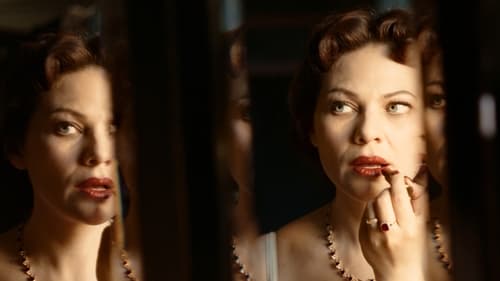
Dau
Once just a girl from the provinces, Nora is now married to a successful scientist and lives together with her family within the confines of a secret and privileged Moscow institute. Nora is visited by her mother for the first time since her wedding. Her mother closely observes the atmosphere within the couple's home, trying to work out whether her daughter is happy. During the course of their intimate conversations the complexity of their contradictory relationship is revealed.

himself
Teodor Currentzis, one of the most gifted conductors in the world, spent 7 years working in the city of Perm, Russia. It made him a local hero, while the annual Diaghilev Festival under his guidance became one of the country's biggest contemporary arts events. This story focuses on the last two weeks of Currentzis' tenure in Perm in an attempt to understand how modern Russia and its art come along.

himself
At the heart of this documentary lies the study of the Currentzis phenomenon. What is his creative method? What is the spirit of the music? How to express it most accurately to the audience and what is the freedom and responsibility of the modern artist? To answer these questions, the crew filmed the conductor for 10 years including the tour of his symphony orchestra MusicAeterna in Germany.

Self – Conductor
Considered to be one of his most brilliant creations, Mozart’s Idomeneo is a perfect masterpiece for the two enfants terribles of classical music and opera staging, conductor Teodor Currentzis and stage director Peter Sellars. Joined by the exceptional voices of Russell Thomas, Paula Murrihy, Ying Fang, and Nicole Chevalier, this is a one-of-a-kind performance of the score in the city where its creator was born!

Conductor
Considered to be one of his most brilliant creations, Mozart’s Idomeneo is a perfect masterpiece for the two enfants terribles of classical music and opera staging, conductor Teodor Currentzis and stage director Peter Sellars. Joined by the exceptional voices of Russell Thomas, Paula Murrihy, Ying Fang, and Nicole Chevalier, this is a one-of-a-kind performance of the score in the city where its creator was born!

Music Director
Guiseppe Verdi’s Requiem is still heard mainly in theatre and concert halls. However, the author himself intended this composition to be performed in church, and on special occasions. Conducted by Teodor Currentzis and performed by soloists and musicAeterna choir and orchestra, Verdi’s famous funeral mass returns from the concert stage to Milan’s Church of San Marco, the same place where it was premiered in 1874. The seven parts of the Requiem become steps on the way to comprehending the sacrament of death, the operatic character of orchestral and vocal writing acquires the strictness of the Catholic tradition, and musical images of rage, despair, and rebellion against the inevitable end are crowned with appeasement.

Conductor
Guiseppe Verdi’s Requiem is still heard mainly in theatre and concert halls. However, the author himself intended this composition to be performed in church, and on special occasions. Conducted by Teodor Currentzis and performed by soloists and musicAeterna choir and orchestra, Verdi’s famous funeral mass returns from the concert stage to Milan’s Church of San Marco, the same place where it was premiered in 1874. The seven parts of the Requiem become steps on the way to comprehending the sacrament of death, the operatic character of orchestral and vocal writing acquires the strictness of the Catholic tradition, and musical images of rage, despair, and rebellion against the inevitable end are crowned with appeasement.

Conductor
Guiseppe Verdi’s Requiem is still heard mainly in theatre and concert halls. However, the author himself intended this composition to be performed in church, and on special occasions. Conducted by Teodor Currentzis and performed by soloists and musicAeterna choir and orchestra, Verdi’s famous funeral mass returns from the concert stage to Milan’s Church of San Marco, the same place where it was premiered in 1874. The seven parts of the Requiem become steps on the way to comprehending the sacrament of death, the operatic character of orchestral and vocal writing acquires the strictness of the Catholic tradition, and musical images of rage, despair, and rebellion against the inevitable end are crowned with appeasement.

Self
“The most important work doesn’t take place on stage, but everywhere else,” Teodor Currentzis is convinced. And that is precisely where this film portrait follows him. For eight months, German director Andreas Ammer accompanied the charismatic conductor. He observed him in rehearsals with the SWR Symphony Orchestra, which Currentzis leads as chief conductor since 2018. He has visited him at his former place of activity in Perm, where he led the opera house from 2011 to 2019 and launched his career through meticulous work with his ensemble musicAeterna. He accompanied Currentzis on guest performances and had numerous conversations with him. The result is a many-faceted portrait of the impressive musician, who sees his profession also as a spiritual mission.

Conductor
How do we live together in an age of conflict? How do you heal a divided and angry people? In their 2017 production of Mozart’s La clemenza di Tito, Peter Sellars and Teodor Currentzis examine these questions through the story of a warrior-emperor who brings peace to his divided land and pardons his own would-be assassins. Written under a time crunch (legend has it that it was written in only 18 days, although it is likely an exaggeration) during the last year of Mozart’s life, the opera is based on a libretto written more than half a century earlier by Pietro Metastasio. It was commissioned for the coronation of Leopold II as King of Bohemia, and received its first public performance at the Estates Theatre in Prague on September 6, 1791.
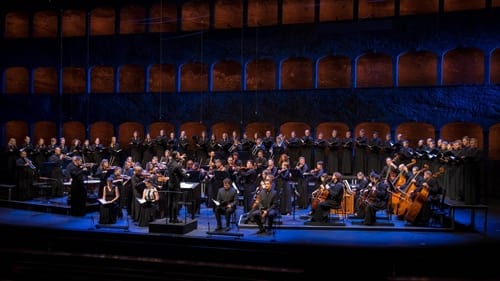
Conductor
Mozart’s Requiem – his final and unfinished masterpiece – is an extraordinary work. Discover the piece at the Salzburg Festival in the hands of conductor Teodor Currentzis, the ensemble musicAeterna, Anna Prohaska (soprano), Katharina Magiera (contralto), Mauro Peter (tenor), and Tareq Nazmi (bass). Few musical works are as steeped in legend as Mozart’s Requiem in D minor, K. 626. Commissioned anonymously by the eccentric count Franz von Walsegg, the funereal oeuvre would become Mozart’s last: when he died on December 5, 1791, only the Requiem aeternam and Kyrie movements were fully composed and orchestrated. Completed by other composers (Mozart’s student Franz Xaver Süssmayer in particular) using Mozart’s sketches and notes, the resulting work weaves the emotions we associate with death into a timeless musical exploration of every human being’s destiny, and constitutes a powerful final testament to its creator’s genius.
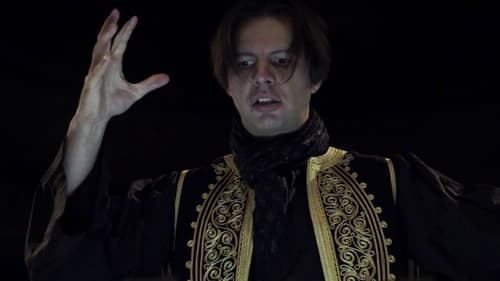
Self
For many, the Russian city of Perm might seem like the end of the world, isolated in the foothills of the Ural mountains. But it is in this rapidly developing industrial city – which is establishing itself as one of Russia’s modern cultural centers – that the Greek conductor Teodor Currentzis has been quietly revolutionizing classical music with his ensemble musicAeterna. The film follows the recording sessions of Mozart’s Don Giovanni, documenting the artists’ habits and painting a portrait of this exuberant conductor.

Music Director
Giuseppe Verdi based his famous opera on the novel “The Lady of the Camellias” by Alexandre Dumas. Robert Wilson’s production of Violetta Valéry’s tragic fate is his first work at the State Theater of Linz, Austria, one of the most modern operatic stages in Europe by architect Terry Pawson. After the run in Linz, the production was transferred to the Opera House in Perm, Russia, where the production was conducted by Teodor Currentzis. In 2017, the work received a “Golden Mask”, the most prestigious Russian theater award, in three categories (Teodor Currentzis, Best Conductor; Nadezhda Pavlova, Best Female Singer; Robert Wilson, Best Lighting Design).

Conductor
Giuseppe Verdi based his famous opera on the novel “The Lady of the Camellias” by Alexandre Dumas. Robert Wilson’s production of Violetta Valéry’s tragic fate is his first work at the State Theater of Linz, Austria, one of the most modern operatic stages in Europe by architect Terry Pawson. After the run in Linz, the production was transferred to the Opera House in Perm, Russia, where the production was conducted by Teodor Currentzis. In 2017, the work received a “Golden Mask”, the most prestigious Russian theater award, in three categories (Teodor Currentzis, Best Conductor; Nadezhda Pavlova, Best Female Singer; Robert Wilson, Best Lighting Design).

Teodor Currentzis

Self – Conductor
Continuing its tradition of unearthing little-known 20th-century operas, the Bregenz Festival presented the first staged production of Polish-Russian composer Mieczysław Weinberg’s “The Passenger” in 2010. Written in 1967/68, the opera relates the chance meeting of a former concentration camp guard and one of her former inmates on an ocean liner years after the war.

Conductor
Continuing its tradition of unearthing little-known 20th-century operas, the Bregenz Festival presented the first staged production of Polish-Russian composer Mieczysław Weinberg’s “The Passenger” in 2010. Written in 1967/68, the opera relates the chance meeting of a former concentration camp guard and one of her former inmates on an ocean liner years after the war.

Conductor
In 2010, for the first time in its history, the Bolshoi Opera presented Alban Berg’s masterpiece Wozzeck conducted by Teodor Currentzis. Dmitri Cherniakov’s aim with this bold, sensitive transposition was “to highlight the hidden sorrows of a late twentieth-century man dwelling in a megalopolis.”

Self – Conductor
Iolanta is a one act lyric opera, sung in Russian, by Tchaikovsky. Performed in the style of a nineteenth-century Italian melodrama, the scenes have a recitative introduction followed by a single arioso, aria, duet or chorus. Persephone is a three act melodrama, sung in French, by Stravinsky. It is a story of regeneration, symbolised in Sellars use of dancers from the Cambodian dance company, Amrita Performing Arts. Peter Sellars, one of the most innovative creators on today's stage, has linked these two productions by using the same stage setting, instantly archaic yet modern, and lit by rich colours to define the journey from darkness to light.

Conductor
Iolanta is a one act lyric opera, sung in Russian, by Tchaikovsky. Performed in the style of a nineteenth-century Italian melodrama, the scenes have a recitative introduction followed by a single arioso, aria, duet or chorus. Persephone is a three act melodrama, sung in French, by Stravinsky. It is a story of regeneration, symbolised in Sellars use of dancers from the Cambodian dance company, Amrita Performing Arts. Peter Sellars, one of the most innovative creators on today's stage, has linked these two productions by using the same stage setting, instantly archaic yet modern, and lit by rich colours to define the journey from darkness to light.

Music Director
Iolanta is a one act lyric opera, sung in Russian, by Tchaikovsky. Performed in the style of a nineteenth-century Italian melodrama, the scenes have a recitative introduction followed by a single arioso, aria, duet or chorus. Persephone is a three act melodrama, sung in French, by Stravinsky. It is a story of regeneration, symbolised in Sellars use of dancers from the Cambodian dance company, Amrita Performing Arts. Peter Sellars, one of the most innovative creators on today's stage, has linked these two productions by using the same stage setting, instantly archaic yet modern, and lit by rich colours to define the journey from darkness to light.

Self – Conductor
A superb adaptation of Purcell's the Indian Queen, staged and directed by Peter Sellars and performed in 2013 at the Teatro Real in Madrid. Peters Sellars combines John Dryden and Robert Howard's libretto with a short-story written by the Nicaraguan writer Rosario Aguilar, La niña blanca y los pájaros sin pies.

Music Director
A superb adaptation of Purcell's the Indian Queen, staged and directed by Peter Sellars and performed in 2013 at the Teatro Real in Madrid. Peters Sellars combines John Dryden and Robert Howard's libretto with a short-story written by the Nicaraguan writer Rosario Aguilar, La niña blanca y los pájaros sin pies.

Conductor
A superb adaptation of Purcell's the Indian Queen, staged and directed by Peter Sellars and performed in 2013 at the Teatro Real in Madrid. Peters Sellars combines John Dryden and Robert Howard's libretto with a short-story written by the Nicaraguan writer Rosario Aguilar, La niña blanca y los pájaros sin pies.

Conductor
Recorded at the Paris Opera and co-produced with Siberia’s Novosibirsk Opera, this new Macbeth uses cutting-edge multimedia technology to give the viewer a fresh perspective on the work. Google Earth satellite images plunge us into the heart of the action: a gloomy square surrounded by soulless buildings, and the interior of an aristocratic residence.

